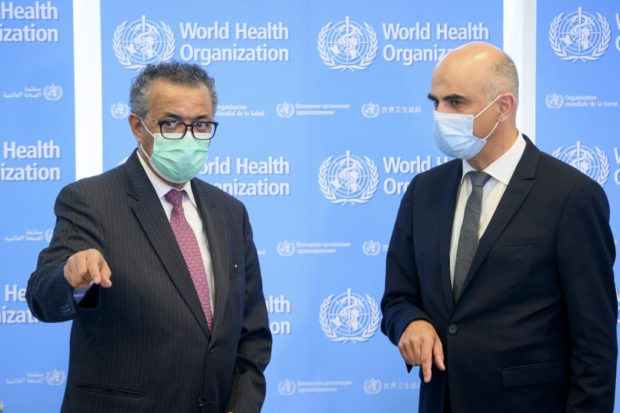COVID-19 shadow hangs over WHO international meet

Swiss Interior and Health Minister Alain Berset (R) and the Director General of the World Health Organization (WHO) Tedros Adhanom Ghebreyesus (L) speak during a bilateral meeting after signing the BioHub Initiative with a global Covid-19 Pathogen repository in Spiez laboratory on the sideline of the opening of the 74th World Health Assembly at the WHO headquarters in Geneva on May 24, 2021. (Photo by LAURENT GILLIERON / POOL / AFP)
GENEVA — Calls for World Health Organization reform and steps to avert future pandemics feature high on the agenda as the UN agency kicks off its annual member states’ meeting on Monday.
With the Covid-19 crisis still raging and wealthy nations continuing to hoard most doses of life-saving vaccines, the WHO’s main decision-making body has plenty to discuss.
The 74th World Health Assembly (WHA) begins Monday with statements from national leaders, including French President Emmanuel Macron, health ministers and other high-level representatives of the WHO’s 194 member states.
The discussions run until June 1 focusing heavily on efforts to rein in the pandemic and on calls to revamp the entire global health approach to help prevent future Covid-like catastrophes.
There is much at stake, but it remains unclear whether countries will step up to the plate.
Article continues after this advertisementWHO chief Tedros Adhanom Ghebreyesus, who will also address the opening of the virtual gathering, said last week that this year’s WHA was “arguably one of the most important” ever.
Article continues after this advertisementPushed to the brink
On the agenda is discussion of major proposed reforms of the UN health agency, which has been pushed to the brink by Covid.
“The past year has been the most testing in our organization’s history,” Tedros acknowledged.
A highlight of this year’s WHA will come on Tuesday when ministers and diplomats discuss the findings of three separate independent panels that assessed aspects of the global pandemic response.
Finding that countries and institutions had been woefully unprepared to deal with the crisis, the experts argued for a total overhaul of the global alarm system.
They also urged reform of the WHO to boost its independence, transparency and funding.
A draft resolution to strengthen the organization meanwhile does not seem to go as far as many had hoped.
It calls for the creation of a new working group to study and streamline the various recommendations in the reports and create concrete proposals for the 2022 WHA to consider.
It also calls on the WHO chief to propose concrete ways of improving the global health alert system, including possibly creating regional alerts.
And it urges the creation of a pilot project, which would be voluntary at first, where countries would submit to regular reviews by other member states of their pandemic preparedness, in the same way they undergo reviews of their rights situations before the UN Human Rights Council.
However, it stops short of explicitly backing the experts’ recommendation to hand the WHO the power to travel to countries to investigate serious health threats without waiting for an invitation from the member states concerned.
There has been significant pushback to that proposal from some countries wary of encroachment on their sovereignty.
Experts have also highlighted the importance of boosting confidence in the WHO’s independence, which has taken a hit as countries have traded blame over the crisis and accused the organization of taking sides.
One way of doing this, they suggested, would be to limit the WHO director-general’s time in office to a single seven-year term, instead of the current possible two five-year terms.
Gro Harlem Brundtland, co-chair of the Global Preparedness Monitoring Board and a former WHO chief, has backed the move, saying it would erase suspicions the WHO leader was being “lobbied to be re-elected”.
Pandemic treaty
A number of countries are also pushing to start negotiations during the WHA towards a new international treaty to prepare for the next global pandemic — and avoid the unseemly scramble for vaccines hampering the international Covid-19 response.
Covid will not be the only subject of discussion. There are more than 70 issues on the WHA agenda, including antimicrobial resistance and patient safety.
And like every year, the assembly appears set to begin Monday with calls from around a dozen countries to allow Taiwan to participate as an observer.
Taiwan has been excluded from the WHO for years amid pressure from China, which regards the self-governed democratic island of 23.5 million people as part of its own territory.
Critics say this does not make sense, especially amid calls for global unity in the pandemic fight.
But typically efforts simply to add the issue to the WHA agenda fail.
For more news about the novel coronavirus click here.
What you need to know about Coronavirus.
For more information on COVID-19, call the DOH Hotline: (02) 86517800 local 1149/1150.
The Inquirer Foundation supports our healthcare frontliners and is still accepting cash donations to be deposited at Banco de Oro (BDO) current account #007960018860 or donate through PayMaya using this link.